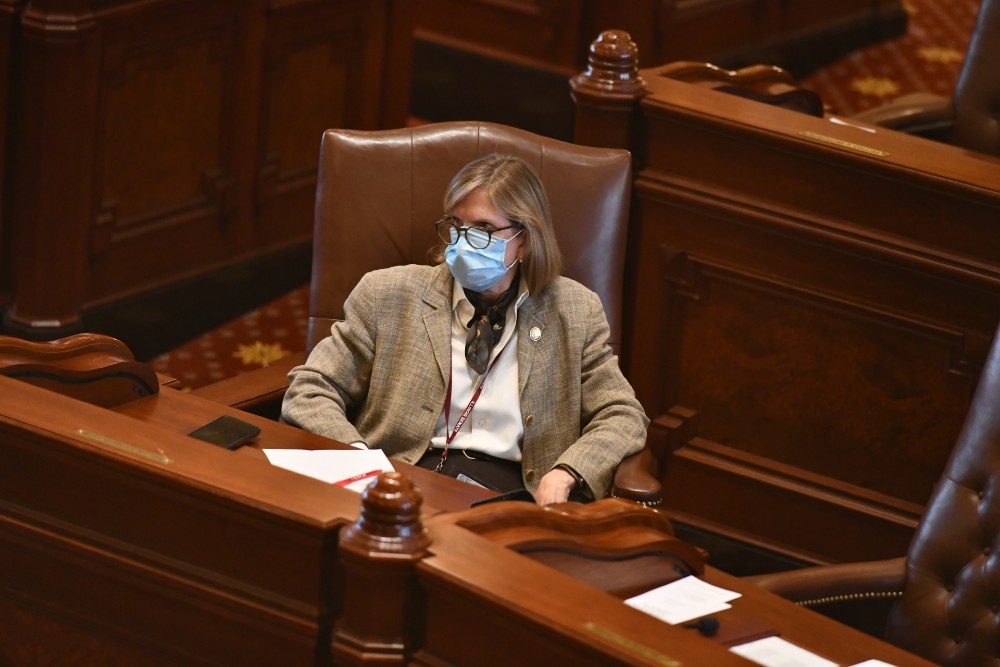Glowiak Hilton urges parents to know the signs of mental health crises
- Category: News
 WESTERN SPRINGS – With students being away from the classroom for more than two months, State Senator Suzy Glowiak Hilton (D-Western Springs) is sharing mental health resources with parents to keep their children well during the pandemic.
WESTERN SPRINGS – With students being away from the classroom for more than two months, State Senator Suzy Glowiak Hilton (D-Western Springs) is sharing mental health resources with parents to keep their children well during the pandemic.
“This is a scary and confusing time for many children,” Glowiak Hilton said. “Being away from their friends and teachers can have a negative impact on their mental health. Parents should know the signs.”
The Centers for Disease Control posted guidelines on how to recognize behavioral changes that may indicate they are experiencing a mental health crisis. Notable behaviors include returning to behaviors they have outgrown, excessive worry, irritability, acting out and avoidance of activities enjoyed in the past.
Guidance on how to talk to a child about the COVID-19 pandemic were released by both the Centers for Disease Control and the Mayo Clinic. Parents can ease their child’s worries by reassuring them they are safe, helping them find ways to connect with peers online and by teaching everyday actions to reduce the spread of germs.
Glowiak Hilton: New money for small business programs available
- Category: News
 WESTERN SPRINGS – With small businesses struggling to cope with the economic fallout of the COVID-19 pandemic, State Senator Suzy Glowiak Hilton (D-Western Springs) and the Illinois Department of Commerce and Economic Opportunity announced new funding for Small Business Development Centers.
WESTERN SPRINGS – With small businesses struggling to cope with the economic fallout of the COVID-19 pandemic, State Senator Suzy Glowiak Hilton (D-Western Springs) and the Illinois Department of Commerce and Economic Opportunity announced new funding for Small Business Development Centers.
“Even though most businesses will soon reopen, many will need additional help to survive,” Glowiak Hilton said. “Small Business Development Centers provide valuable assistance and I encourage our local business community to seek their help during these difficult times.”
Glowiak Hilton: Local restaurants need your support
- Category: News

“The small businesses that make our community unique are hurting, especially those in the food service and hospitality industries,” Glowiak Hilton said. “We can all do a small part by visiting these local restaurants as they reopen for outdoor seating.”
Glowiak Hilton voted to freeze lawmaker pay for the upcoming year
- Category: News
 SPRINGFIELD – With state resources stretched thin, State Senator Suzy Glowiak Hilton (D-Western Springs) voted to freeze her pay for the upcoming year so that taxpayer dollars can go to help struggling families.
SPRINGFIELD – With state resources stretched thin, State Senator Suzy Glowiak Hilton (D-Western Springs) voted to freeze her pay for the upcoming year so that taxpayer dollars can go to help struggling families.
Under state law, legislators receive an automatic cost of living adjustment each year. However, Senator Glowiak Hilton voted for a budget that provides $0 to pay for these automatic raises.
“During these unprecedented times all our state funds need to go toward helping those affected by the pandemic,” Glowiak Hilton said. “I am proud to freeze my salary. That money will be better spent helping provide relief to our small business community and getting people safely back to work.”
Illinois Comptroller Susana Mendoza, who processes legislator’s pay checks, confirmed Sunday that the budget the General Assembly recently passed does not contain any pay raises for legislators.
More Articles …
Page 51 of 68




